#Ground Sumac
Explore tagged Tumblr posts
Photo

Spinach Triangles Fatayer Sabanegh These spinach triangles use an unusual flavoring, ground sumac, and are made with phyllo dough.
0 notes
Photo

Spinach Triangles Fatayer Sabanegh Recipe These spinach triangles are made with phyllo dough and a novel flavoring called ground sumac. 2 tablespoons ground sumac, 1 cup butter, 3 tablespoons fresh lemon juice, 1/2 teaspoon ground black pepper, 2 tablespoons extra-virgin olive oil, 1 package frozen phyllo dough thawed, 1 onion finely chopped, 2 tablespoons pine nuts, 1 pinch salt, 4 cups fresh spinach leaves chopped
0 notes
Photo
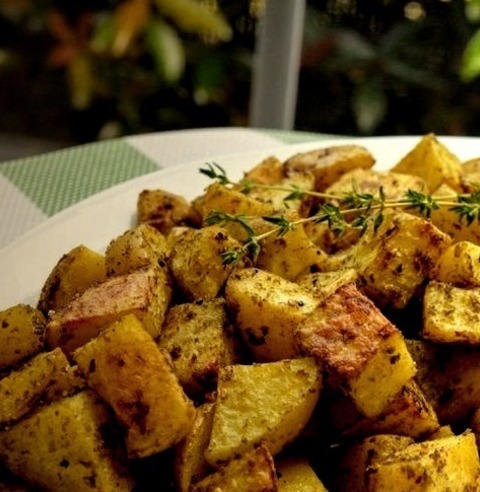
Za'atar Roasted Potatoes Recipe These roasted potatoes are seasoned with za'atar, a Middle Eastern spice mixture consisting of ground dried thyme, toasted sesame seeds, sumac and salt. 2 tablespoons za'atar, 1 teaspoon salt, 1.5 pounds Yukon Gold potatoes cut into 1/2-inch cubes, 1/2 teaspoon ground black pepper, 2 tablespoons extra virgin olive oil
1 note
·
View note
Text
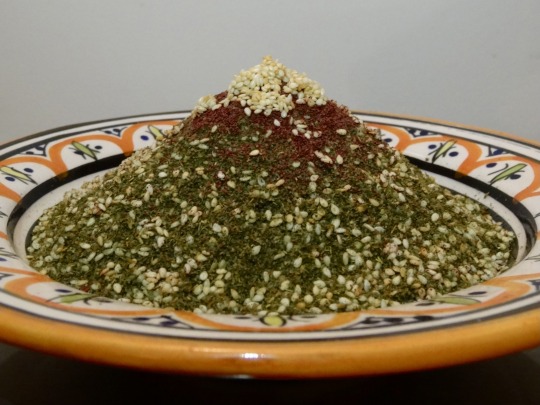
[ID: A decorative orange ceramic plate with a pyramid of green herbs and sesame seeds, topped with deep red sumac and more sesame seeds. End ID]
زعتر فلسطيني / Za'tar falastinia (Palestinian spice blend)
Za'tar (زَعْتَر; also transliterated "za'atar," "zaatar" and "zatar") is the name of a family of culinary herbs; it is also the name of a group of spice blends made by mixing these herbs with varying amounts of olive oil, sumac, salt, roasted sesame seeds, and other spices. Palestinian versions of za'tar often include caraway, aniseed, and roasted wheat alongside generous portions of sumac and sesame seeds. The resulting blend is bold, zesty, and aromatic, with a hint of floral sourness from the sumac, and notes of licorice and anise.
Za'tar is considered by Palestinians to have particular national, political, and personal importance, and exists as a symbol of both Israeli oppression and Palestinian home-making and resistance. Its major components, olive oil and wild thyme, are targeted by the settler state in large part due to their importance to ecology, identity, and trade in Palestine—settlers burn and raze Palestinian farmers' olive trees by the thousands each year. A 1977 Israeli law forbade the harvesting of wild herbs within its claimed borders, with violators of the law risking fines and confiscation, injury, and even death from shootings or land mines; in 2006, za'tar was further restricted, such that even its possession in the West Bank was met with confiscation and fines.
Despite the blanket ban on harvesting wild herbs (none of which are endangered), Arabs are the only ones to be charged and fined for the crime. Samir Naamnih calls the ban an attempt to "starve us out," given that foraging is a major source of food for many Palestinians, and that picking and selling herbs is often the sole form of income for impoverished families. Meanwhile, Israeli farmers have domesticated and farmed za'tar on expropriated Palestinian land, selling it (both the herb and the spice mixture) back to Palestinians, and later marketing it abroad as an "Israeli" blend; they thus profit from the ban on wild harvesting of the herb. This farming model, as well as the double standard regarding harvesting, refer back to an idea that Arabs are a primitive people unfit to own the land, because they did not cultivate or develop it as the settlers did (i.e., did not attempt to recreate a European landscape or European models of agriculture); colonizing and settling the land are cast as justified, and even righteous.
The importance of the ban on foraging goes beyond the economic. Raya Ziada, founder of an acroecology nonprofit based in Ramallah, noted in 2019 that "taking away access to [wild herbs] doesn't just debilitate our economy and compromise what we eat. It's symbolic." Za'tar serves variously as a symbol of Palestinians' connection to the land and to nature; of Israeli colonial dispossession and theft; of the Palestinian home ("It’s a sign of a Palestinian home that has za’tar in it"); and of resistance to the colonial regime, as many Palestinians have continued to forage herbs such as za'tar and akkoub in the decades since the 1977 ban. Resistance to oppression will continue as long as there is oppression.
Palestine Action has called for bail fund donations to aid in their storming, occupying, shutting down, and dismantling of factories and offices owned by Israeli arms manufacturer Elbit Systems. Also contact your representatives in the USA, UK, and Canada.
Ingredients:
Za'tar (Origanum syriacum), 250g once dried (about 4 cups packed)
250g (1 2/3 cup) sesame seeds
170g (3/4 cup) Levantine sumac berries, or ground sumac (Rhus coriaria)
100g (1/2 cup) wheat berries (optional)
2 Tbsp olive oil
1 Tbsp aniseed (optional)
1/2 Tbsp caraway seeds (optional)
Levantine wild thyme (also known as Bible hyssop, Syrian oregano, and Lebanese oregano) may be purchased dried online. You may also be able to find some dried at a halal grocery store, where it will be labelled "زعتر" (za'tar) and "thym," "thyme," or "oregano." Check to make sure that what you're buying is just the herb and not the prepared mixture, which is also called "زعتر." Also ensure that what you're buying is not a product of Israel.
If you don't have access to Levantine thyme, Greek or Turkish oregano are good substitutes.
Wheat berries are the wheat kernel that is ground to produce flour. They may be available sold as "wheat berries" at a speciality health foods store. They may be omitted, or replaced with pre-ground whole wheat flour.
Instructions:
1. Harvest wild thyme and remove the stems from the leaves. Wash the leaves in a large bowl of water and pat dry; leave in a single layer in the sun for four days or so, until brittle. Skip this step if using pre-dried herbs.
2. Crumble leaves by rubbing them between the palms of your hands until they are very fine. Pass through a sieve or flour sifter into a large bowl, re-crumbling any leaves that are too coarse to get through.
Crumbling between the hands is an older method. You may also use a blender or food processor to grind the leaves.
3. Mix the sifted thyme with a drizzle of olive oil and work it between your hands until incorporated.
4. Briefly toast sumac berries, caraway seeds, and aniseed in a dry skillet over medium heat, then grind them to a fine powder in a mortar and pestle or a spice mill.
5. Toast sesame seeds in a dry skillet over medium heat, stirring constantly, until deeply golden brown.
6. (Optional) In a dry skillet on medium-low, toast wheat berries, stirring constantly, until they are deeply golden brown. Grind to a fine powder in a spice mill. If using ground flour, toast on low, stirring constantly, until browned.

Some people in the Levant bring their wheat to a local mill to be ground after toasting, as it produces a finer and more consistent texture.
7. Mix all ingredients together and work between your hands to incorporate.
Store za'tar in an airtight jar at room temperature. Mix with olive oil and use as a dipping sauce with bread.
2K notes
·
View notes
Text
let me open by saying I Know How This Sounds (fem whose undergraduate chemistry professor recommended ze take turmeric to cure zyr arthritis, etc) so no hard feelings if you keep scrolling, but hopefully folks who know me know i'm speaking honestly about my experiences, even if those don't end up being the same for other people. so!
2 Tbsp of a common kitchen spice is doing as much or more to manage my ME/CFS as any of my meds or self-medicating drugs
@lakeeffectbitch outlines a way of trying this with a control in their reddit post (link); i just went directly to the one they thought might work so i'll put my experiences & the science/theory behind this under a cut for folks who want to avoid potential placebo effect :)
i'll get more specific about this in the "spoilers" but please be aware, especially folks with diabetes or other blood sugar conditions, that this substance may cause a blood sugar drop. it's less likely at this dose but probably keep a sugary snack on hand just in case
if you experience post-exertional malaise & want to try this but don't have spare money to spend on spices feel free to dm me & i'll see if i can help!
my experience:
i took 2 Tbsp ground sumac mixed with warm water on February 11. i tried taking it with a straw first because that's what my colonoscopy prep had said would make that go down easier but because the sumac particles were so big they didn't want to remain suspended & trying to get them in the straw was difficult, which then made it harder to swallow without, yknow, noticing that you're slurping down sediment
what worked better was getting the powder wet, putting a big clump of it on my tongue, then swallowing it with water like a pill
within about half an hour of taking the sumac it was like my fatigue just faded around me where i stood. it dissolved to the background & when i thought "oh i want to do this" or "i should do that" suddenly i found myself just doing it. i had spent the past week at least bedridden except for the bathroom, & though i took the sumac on a better day, i'd been planning to return to bed with a snack after taking it.
instead, i made myself lunch, and i sat on the couch to eat it. all of this was without taking an edible that day; usually i've gotta take at least 25mg delta 8 + 25mg cbd to even consider sitting on the couch. also, it was storming.
from my write-up the day of: "everything felt very sharp & clear & lucid." i washed the dishes from my lunch. all of these activities were about 2 hours, & at that point i emphatically needed a nap. waking up felt like after taking a muscle relaxer & sleeping: my muscles were more relaxed, & my whole body felt like it'd gotten a bit of a break
i've taken sumac at least 8 times since then on at least 5 different days (this time by modifying this sumac tart recipe to include a lot of sumac powder in the crust, which has been much more enjoyable than the Glass O' Sediment lmao) & adjusting for factors like weather, the effect has been comparable every time:
i watched Inception on the couch with my husband, & understood when she explained things to me
i watched leverage on the couch all day when it was below freezing
i worked a bit on fanfics i've barely been able to touch in a year
i "meal prepped" measuring spices, gathering ingredients, & soaking beans to make beans & rice in the instant pot later that day. i literally can't remember the last time i was able to use my instant pot, after thinking about it i think it was when i made palak paneer last summer, but that was a one-off special occasion thing, i've used it maybe 3 other times since developing ME
i wrote this post
the science:
okay a lot of this shit was over my head before i developed ME so i'm gonna be summarizing at my level lol, look to @lakeeffectbitch for a higher-level analysis
but what i do know! (all images from "The malic acid inhibiting inflammation in ankylosing spondylitis by interfering M1 macrophage polarization" by Ji et al., January 2025)
sumac contains high levels of malic acid, which is found in certain fruits (apples, peaches, etc)
the drugs.com page classifies malic acid as an inactive ingredient, so there are no known drug interactions
mice with ankylosing spondylitis had lower levels of peripheral malic acid than control mice
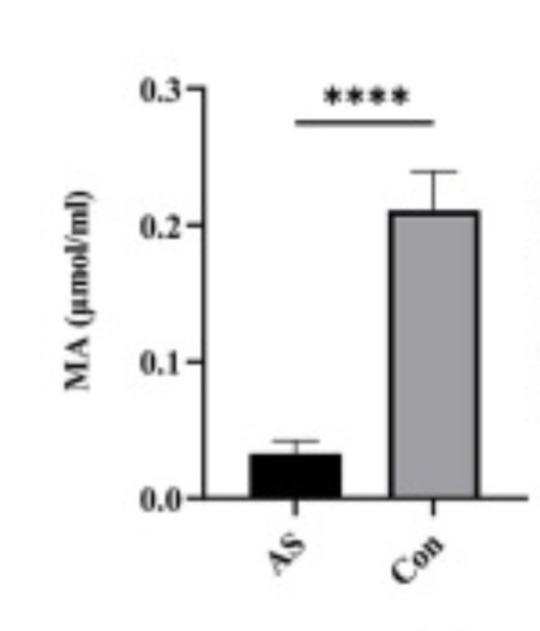
ID: bar graph showing mice with AS had about 0.03 micromoles per milliliter of peripheral malic acid, compared to the control mice level of over 0.2 micromoles per milliliter. the difference is labeled significant via asterisks. end ID
mice with higher malic acid concentrations had lower ESR and CRP (inflammation markers)
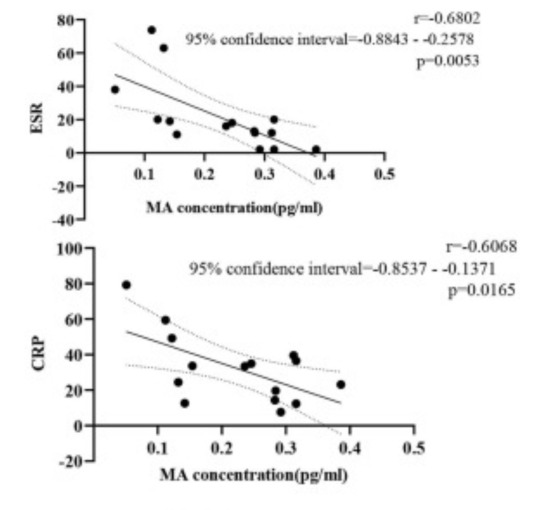
ID: two graphs showing lines with a downward slope. the top graph, ESR versus malic acid concentration, is labeled: r=-0.6802, 95% confidence interval =-0.8843 – -0.2578, p=-0.0053. the graph shows ESR, an inflammation marker, decreasing as malic acid concentration increases. the bottom graph, CRP versus malic acid concentration, is labeled: r=-0.6068, 95% confidence interval =-0.8537 – -0.1371, p=-0.0165. the graph shows CRP, an inflammation marker, decreasing as malic acid concentration increases. end ID
mice treated with malic acid had lower levels of TNF-alpha than the mice with untreated ankylosing spondylitis. humira & similar biologics that treat autoimmune diseases are TNF-alpha blockers
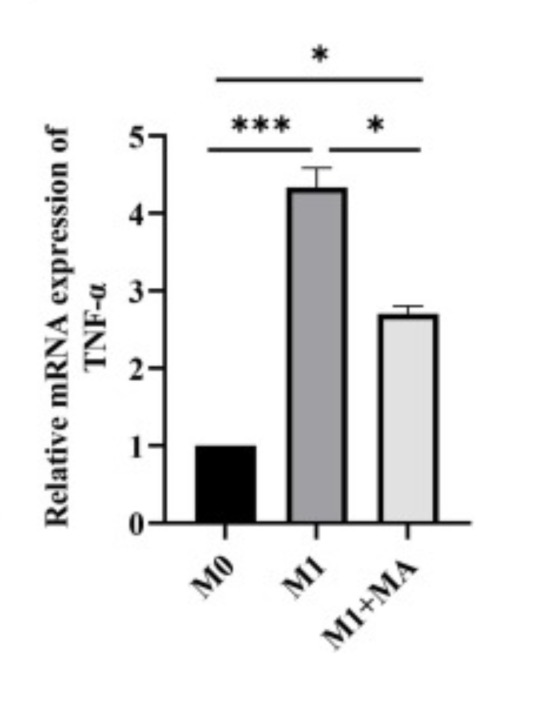
ID: a bar graph of relative mRNA expression of TNF-alpha. M0, the control mice, has a relative expression of 1. M1, the mice with ankylosing spondylitis that did not receive treatment, has a relative expression of slightly less than 4.5. M1+MA, the mice with ankylosing spondylitis who received the malic acid treatment, has a relative expression slightly less than 3. this indicates that the mice treated with malic acid had lower expression of TNF-alpha than the untreated mice. asterisks between M0 and M1 and between M1 and M1+MA indicate significance. end ID
the mitochondrial function of M2 macrophages in mice treated with malic acid "was significantly enhanced"
analysis of the mice's spinal tissue blew my fucking socks off. trying not to jump to conclusions & i know journal articles are full of errors but that looks potentially disease-modifying.
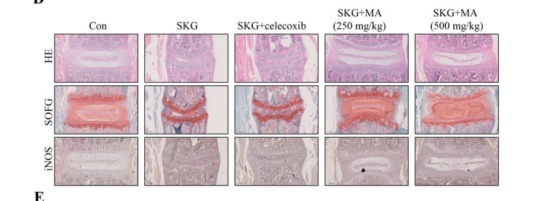
ID: a 5x3 presentation of samples of mouse spinal tissue. the control mice, which are healthy, have thick, undamaged, glowing tissue. the mice with ankylosing spondylitis have thin, curved, cracked-looking tissue. the mice treated with celecoxib, a common prescription NSAID for arthritis, appear very similar to the untreated mice. the mice treated with 250mg/kg of malic acid per day have tissue in between the untreated and healthy appearances; the tissue is "glowing" like the healthy tissue but still narrower and curved, although less so than the untreated tissue. the mice treated with 500mg/kg of malic acid per day have tissue which looks even closer to the healthy appearance, with less curvature than the other treatment groups. end ID
since i started drafting this post i've started taking these malic acid supplements from Nature's Life – the full dose made me feel weird including some heartburn so i cut the capsules & take roughly 2/3 – 3/4 of it at a time (i drop the rest into a spare pill jar to make more doses from). it's been similarly effective for me
please be aware that the supplement instructions say to only take it once a day, i haven't had any issues but everybody is different & this avenue is definitely under-researched! (the mice were given 250mg/kg per day which for me would be like 27 grams but i am not a mouse lol)
#myalgic encephalomyelitis#me/cfs#chronic fаtiguе ѕуndrоmе#chronic fatigue#post exertional malaise#pem#chronic pain#chronic illness#long covid#malic acid#sumac#mac.txt#image described
247 notes
·
View notes
Text
Astra's List of Baneful Components
I hope to make this list as comprehensive as possible and will be adding to it whenever I discover something new. If anyone has any suggestions for things that should be added, please let me know. 🖤
Herbs/Plants
• Bloodroot- Substitutes blood
• Jezebel Root- Wickedness, ending relationships, punishing cheaters
• Bindweed- Binding, ensnaring
• Dogbane- Deception
• Rue- Misery
• Saffron- Destruction
• Lemon- Sourness/bitterness, reveals damaging truths
• Lemon Verbena- a boost of power, ending relationships
• Lime- Sourness/bitterness, encourages deceit
• Lobelia- Discord
• Hemlock- Discord, sadness
• Spanish Moss- Bad luck
• Vertiver- Silence
• Mace- Misery, strife
• Slippery Elm- Bad luck, negativity
• Bittersweet- Loss, sadness
• Mandrake- Misery, strife
• Mistletoe- Isolation, confusion
• Wormwood- Delusion, misery, strife, madness
• Sumac- Bad luck, negativity
• Mullein- Spirit work, nightmares
• Patchouli- Illness
• Mustard Seed- Strife, discord
• Hemlock- Destroys sex drive, break ups
• Poke Root- Confusion, upset
• Blackberry Root- Distress
• Myrrh- A boost of power
• Tobacco- Subs any baneful herb
• Belladonna- Discord, conflict, illness, suffering
• Cinquefoil- Discomfort
• Ague Weed- Confusion
• Blueberry- Confusion
• Cloves- Domination, stops gossip
• Stinging Nettle- Jealousy, discomfort
• Cramp Bark- Pain, illness
• Licorice Root- Domination
• Tormentil- Distress, harm
• Asafoetida- Drives enemies away
• Henbane- Emotional instability, melancholy, storms, spirit work
• Hot Peppers- Anger, fighting, discord
• Blackthorn- Illness, bad omens
• Elder- Suffering, spirit work
• Dittany- Mistakes, setbacks, depression
• Garlic- Disgust and repulsion
• Yew- Spirit work, destruction
• Onion- Disconnects relationships, strife
• Poppy Seeds- Intoxication, confusion, discord
• Foxglove- Manipulation, heartbreak, devastation
• Alum- Stops communication and speech, impotence
• Wolfsbain- Madness, loneliness, rage
• Knotweed- Binding, trapping
• Black Pepper- Revealing the truth, binding
• Green Apple- Unrequited love
• Radish- Sexual shame, STDs, infidelity
• Yohimbe Bark- Impotency
• Chicory- Discord
• Agrimony- Return to sender
• Datura- Psychic attack, nightmares, misery
• Bay Berry- Depression
• Angelica Root- Misery, strife, distress, discord
• Dragon's Blood- Destruction, pain, misery
• Chili Powder- Anxiety
• Bladderwrack- Illness, weakness
• Boneset- Distress, confusion
• Black Locust/Hawthorne Thorns- Struggle, agony, injuries, wounds
• Calamus- Control, domination, commanding, compelling
• Cocoa- Bitterness
• Black Mustard Seed- Confusion, discord, non-stop trouble
• Sumac- Discomfort, bad luck, painful lessons
• Willow Bark- A dose of their own medicine
• Stagger Weed- Disabling, trips them up
• Bar Berry- Stops progress
• Black Nightshade- Sickness, depression
• Oleander- Devastation, silence, doom
Crystals
• Opal- Amplifies negative energy (Black Opal works best)
• Ruby- Focuses intent on target
• Malachite- Anxiety, fear, cowardice, nausea
• Peridot- Confusion
• Obsidian- Reveal their darkness
• Petrified Wood- Ruin, abandonment
• Clear Quartz- Amplifier and energy holder
• Black Moonstone- Deceit, distrust, confusion, paranoia
• Onyx- Breakups, loss
• Amethyst- Self destruction, nightmares, paranoia
• Garnet- Siphons target's energy, steal their love/friends
• Diopside- Reveals a target's true colors
• Bloodstone- Sucks the life force from enemies, chaos, frailty
• Carnelian- Pain, anger, rage
• Black Quartz- Darkness
• Sardonyx- Return to sender
• Jet- Cloud their vision/blind them
• Serpentine- Illness, unsteady ground, mishaps
• Jade- Domination, control, manipulation
• Amber- Trapping, cause obstacles and setbacks
• Hematite- Negativity
Misc. Ingredients
• Salt- Painful cleansing, salt in their wounds
• Sulphur- Stops plans, causes harm
• Alcohol- Makes the work last
• Vinegar- Souring, dissolves relationships
• Pins/Needles- Pain and agony
• Thumbtacks- Makes the work stick in them
• Razor Blades- Sadistic actions, sharp words
• Broken Glass- Cut ties, emotional wounds
• Scorpions- Betrayal
• Spiders- Danger, ensnarement
• Wasps- Punishment, non-stop pain
• Grave Dirt- Enlists spirit's help
• Snakeskin- Removes them from your path
• Cigarette Butts- Snuff their will
• Thorns- Annoyance, pain
• Dog/Cat Poop- Rottenness, depression, life stinks
• Sticker Burs- Crippling emotional shock
• Spiderwebs- Crossing, binding
• Coffin Nails- Stay home, withdrawal, binding
• Lead- Weigh them down, make them late
• Black Salt- Misery, strife, banishment
• Dog Hair- Agression, combat
• Cat Hair- Passive-Aggression, conflict
• Bad Water- Stagnation, depression, illness
• Murder Scene Dirt- Crimes, complete ruin, terror, demise
• Nails- Binding, pain
• Thumb Tacks- Pain, discomfort
• Broken Glass- Disaster, accidents, injury, pain
• Blood- Longevity, boosts curse power
• War Water- Chaos, psychic warfare, banishing
• Razor/Barbed Wire- Pain, restriction, loss of freedom
• Fish Bones- Decay, bad reputation, loss of friendships
• Moths- Fragility, tunnel vision A
• Goofer Dust- Crossing, misfortune, illness
• Bone Ash- Instability, weakness, demise
• Storm Water- Destruction, upheaval, chaos
• Potato Eyes- Rot, loss of control, sickness
• Cat Claws- Helps curse cling to target, sudden agony
• Butterfly Wings- Loss of control, injury
• Egg Shells- Breaks down barriers and boundaries
• Ants/Ant Hill Dirt- Annoyance, overwhelming, banishing
• Hospital Dirt- Illness and injury
• Bullets- Devastation, destruction, suffering, demise
• Iron- Banishing, destruction
• Super Glue- Permanence, binding, damage
• Dirty Pennies- Financial loss

#satanic witch#satanism#withcraft#demons#demonolatry#lefthandpath#magick#witch#dark#baneful magic#baneful#curses#cursing#spellcraft#spellwork#traditional witchcraft
323 notes
·
View notes
Text
I made a (like 75%) Lore Friendly coastal Wardi dinner. It's baked parrotfish, cowpeas with garlic and onion, and a swallow that we're going to pretend is yam.
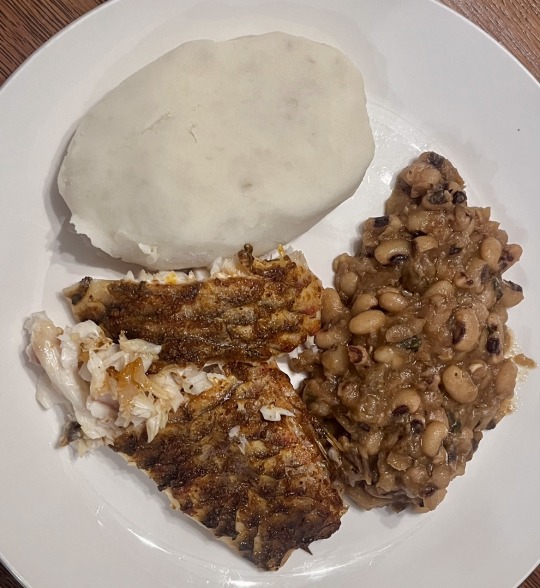
The spice mix is cumin, dried shallots and garlic, coriander, a few tepin chilis, sumac, a tiny bit of turmeric for color (this is accessible but would be imported and expensive) and saffron (this is natively grown but expensive), and salt. I didn't use exact ratios but it's like 50% cumin 50% everything else. I used whole seeds when I had them and ground the mix with a mortar and pestle.
The spices used (or analogs that are Close Enough) would all be Accessible in Wardin, though the variety here is more than the average person has Easy access to or would use for an everyday meal. The basic spice mix most people can get their hands on and will use on the regular is yamnina reyla, which is cumin, coriander, chilis (mid-hot) and a dried + crushed insect that's mostly just used for its vibrant red-orange color.
The spices were mixed with olive oil and a little lime juice (Close Enough to in in-universe fruit) and rubbed on/inside the fish, and then the fish was stuffed with sauteed garlic and onions and baked.
The cowpeas were added to a pot with the remaining sauteed garlic and onions in olive oil, added broth + the same spice mix + extra olive oil + some butter, cooked for over an hour until the beans were soft and the liquid was reduced.
The swallow is the one (1) potato I could find in the house when I realized I forgot to get something for the swallow. Cooked until soft, mashed with a mortar and pestle with as little additional liquid as possible so that it would be Kind Of dense. Potatoes aren't found anywhere near Imperial Wardin and the in-universe version of this meal would use a yam. The in-universe version would also have a higher swallow to everything else ratio. I only had 1 potato and I was hungry.
You eat it with your hands by using the swallow to scoop up the other foods and sponge up any leftover juices. It was pretty good.
Here's the 3 total WIP photos I took
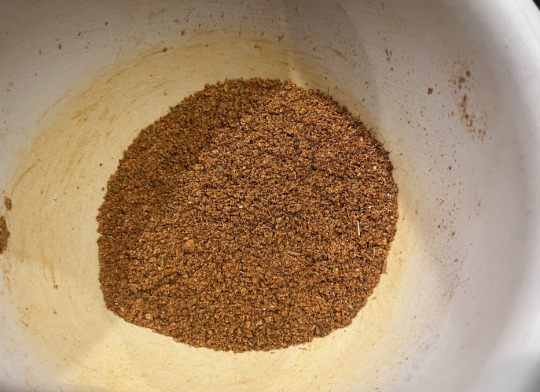
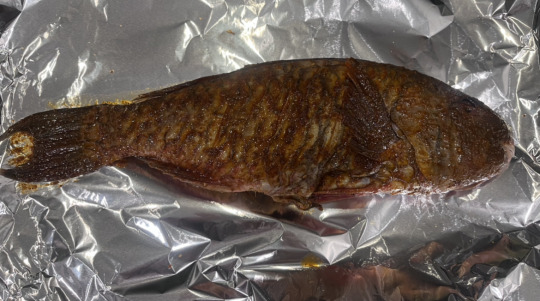
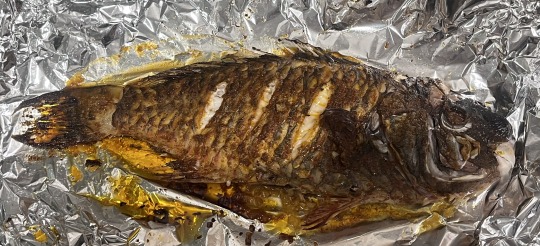
#(Barring the variety of spices) this is a meal an average person could afford every so often. Yams and legumes are something you#eat almost every day and parrotfish would be relatively cheap in coastal cities.#If you're a relatively well-off merchant in the commoner class you might be eating like this pretty often while if you're a peasant this#would be a special occasion but not nearly As special as anything requiring livestock to be slaughtered for your meal.
118 notes
·
View notes
Text

Moroccan-Style Lamb Cottage Pie with Sumac Carrots
Ingredients:
• Lamb Filling:
• 2 tbsp olive oil
• 1 large onion, chopped
• 3 garlic cloves, minced
• 1 lb ground lamb
• 1 large carrot, diced
• 1 red bell pepper, chopped
• 1 can (14.5 oz) diced tomatoes
• 1 tbsp tomato paste
• 1 tsp each: ground cumin, coriander, cinnamon, paprika
• 1/2 tsp each: ground ginger, turmeric
• Salt and pepper
• 1/4 cup each: chopped parsley, cilantro
• Potato Topping:
• 2 lbs potatoes, peeled, chopped
• 1/4 cup milk
• 2 tbsp butter
• Salt and pepper
• Sumac Carrots:
• 1 lb carrots, cut into sticks
• 2 tbsp olive oil
• 1 tsp sumac
• Salt and pepper
• Fresh parsley, chopped (for garnish)
Instructions:
1. Lamb Filling:
1. Heat oil, cook onion until soft. Add garlic, cook 1 min.
2. Add lamb, cook until browned.
3. Add carrot, bell pepper, cook 5 mins.
4. Stir in tomatoes, paste, spices, salt, pepper. Simmer 15-20 mins.
5. Stir in parsley, cilantro. Set aside.
2. Potato Topping:
1. Boil potatoes until tender. Drain, mash with milk, butter, salt, pepper.
3. Assemble & Bake:
1. Preheat oven to 375°F (190°C).
2. Spread lamb in baking dish, top with potatoes. Bake 25-30 mins.
4. Sumac Carrots:
1. Preheat oven to 400°F (200°C).
2. Toss carrots with oil, sumac, salt, pepper. Roast 20-25 mins.
5. Serve:
1. Serve pie with sumac carrots, garnish with parsley.
Enjoy!
#food#food blogs#delicious#recipe#food pics#homemade#foodshow#food photography#dessert#ideas for dinner#potatoes#home made food#daily ideas#daily recipes#food photoshoot
68 notes
·
View notes
Text
hellofresh spice blends
All American Spice Blend
1 tbsp ground cumin
1 tbsp cayenne
1 tbsp onion powder
1 tbsp smoked paprika
2 tsp garlic powder
1 tsp ground coriander
1 tsp salt
1 tsp dried parsley
1/2 tsp black pepper
1/2 tsp dried mustard
1/2 tsp red pepper flakes
1/4 tsp ground allspice
1/8 tsp ground cloves
Berbere Spice Blend
3 part paprika
1 part cayenne
.5 part ground coriander
.25 part ground ginger
.125 part ground cardamom
.125 part ground fenugreek
Bold and Savory Steak Spice Blend
1 part red chili flakes
1 part crushed coriander seed
2 parts crushed dill seed
3 parts crushed mustard seed
4 parts dried minced garlic
4 parts crushed black pepper
Blackening Spice Blend
3 tsp smoked paprika
1.5 tsp garlic powder
.5 tsp white pepper
.5 tsp black pepper
.25 tsp thyme
.25 tsp oregano
.125 tsp low heat cayenne (didn’t even know there was such a thing?)
Burger Spice Blend
1 Tbsp paprika
1 1/4 tsp salt
1 tsp ground black pepper
1/2 tsp garlic powder
1/2 tsp brown sugar
1/2 tsp onion powder
1/4 tsp cayenne
Cajun Spice Blend
2 part paprika
2 part onion powder
1 part garlic powder
1 part dried oregano
1 part dried thyme
.5 part dried basil
.5 part cayenne
Enchilada Spice Blend
1 tbsp. chili powder
1 tbsp. paprika
2 tsp. cumin
2 tsp. light brown sugar
2 tsp. kosher salt
1.5 tsp. onion powder
1.5 tsp. garlic powder
1.5 tsp. Mexican oregano
1 tsp. chipotle chili powder
1 tsp. ground coriander
1 tsp. black pepper
1/4 to .5 tsp. cayenne pepper
Fall Spice Blend
3 parts dried thyme
3 parts ground sage
2 parts garlic powder
1 part onion powder
Fry Seasoning
1 part garlic powder
1 part onion powder
1 part paprika
Herbes de Provence Blend
1 part thyme
1 part rosemary
1 part basil
1 part tarragon
1 part lavender flowers
Italian Seasoning Blend
1 part garlic powder
1 part oregano
1 part basil
1 part black pepper
1 part parsley
Meatloaf Seasoning
2 parts onion powder
2 parts garlic powder
Mediterranean Spice Blend
2 parts dried oregano
1 part dried mint
1 part sumac
1 part ground coriander
Mexican Spice Blend
2 parts chili powder
1 part oregano
1 part smoked paprika
1 part cumin
Moo Shu Spice Blend
1 part ground ginger
1 part garlic powder
Shawarma Spice Blend
2 part turmeric
2 part cumin
1 part dried coriander
1 part garlic powder
1 part paprika
.5 part ground allspice
.5 part black pepper
Southwest Spice Blend
4 part garlic powder
2 part cumin
2 part chili powder
Smoky BBQ Seasoning
8 parts smoked paprika
6 parts granulated sugar
2 parts garlic powder
1 part dry mustard
1 part ground cumin
1 part ground ginger
.5 part black pepper
Smoky Cinnamon Paprika Spice Blend
1 part ground cloves
8 parts onion powder
8 parts ground cinnamon
6 parts smoked paprika
16 parts mustard powder
24 parts sweet paprika
24 parts sugar
Steak Spice Blend
1 part red chili flakes
1 part crushed coriander seed
2 parts crushed dill seed
3 parts crushed mustard seed
4 parts dried minced garlic
4 parts crushed black pepper
3 parts kosher salt
Sweet Smoky BBQ Spice Blend
8 parts smoked paprika
6 parts sugar
2 parts garlic powder
.5 part black pepper
1 part dry mustard
1 part cumin
1 part ground ginger
Thai Seven Spice Blend
2.5 tsp white sesame seeds
1 tsp chili flakes
1 tsp ground coriander
1 tsp onion powder
.5 tsp garlic powder
.5 tsp shrimp extract powder
.25 tsp cinnamon
.125 tsp low heat cayenne
Tunisian Spice Blend
4 parts ground caraway seed
4 parts ground coriander
4 parts smoked paprika
4 parts turmeric
4 parts chili powder
4 parts garlic powder
1 part cayenne pepper
1 part cinnamon
1 part ground black pepper
Turkish Spice Blend
2 part cumin
2 part garlic powder
1 part ground coriander
.25 part ground allspice
.25 part chili flakes
Tuscan Heat Spice Blend
4 parts dried basil
2 parts dried rosemary
2 parts dried oregano
2 parts garlic powder
1 part cayenne pepper
1 part ground fennel
Fajita Spice Blend
4 parts paprika
1 part onion powder
1 part garlic powder
1 part chili powder
1 part cumin
1 parts oregano
20 notes
·
View notes
Text
Some things I’ve been thinking about. At times being an American trad witch is incredibly frustrating and at others it’s absolutely exhilarating, rewarding. Reconnecting with my ancestral ( primarily french and scottish ) lore, magical practices, witchcraft etc has and will continue to inform my practice but I’ll never be a “french” witch. I’ll never be a “scottish” witch. I can find a lone hawthorn or a sacred tree guarding a hidden spring to tie the cloutie to, I can divine via a snail’s mucus trail, Fly to the Sabbath to meet The Abbess, heed the Dame Blanches, pluck the golden bloom with songs to St Columba, safeguard me and mine via silver, spring water and juniper. Yet there’s many things I’ll never know or be able to do. Whether that’s because these things are so tied to the land or a specific place, language barriers, ( working to overcome this one ) or due to the ( well warranted) gate keeping of lore and practices.
This used to be a source of great confusion for me. I think because I was afraid( due to my previous new age fuckwittery ) to experiment, do anything other than what I understood as “traditional”. My understanding being too rigid at the time; the pendulum swung from one end of the spectrum to the other. This delayed my progress and “froze” me. I was left wondering what an “American” trad craft would look like; most our books do come from a European POV. Learning of our own magical traditions as well as those of my Canadian family ( still working on that one haha ) helped. Reading Robin Kimmere helped. Reading Schulke, him being an American and writing on American plants, helped too. I’ve come to know Sugar Maple and Plantain as powerful spirits. Both teaching important lessons on how to rectify my ancestors mistakes, to foster relations with the First Peoples and how to incorporate the magic of this land into my craft. Rather than being frustrated by my being American I see it as a challenge now. I get to explore spirits, plants, places, animals, spiritual/physical ecologies ( is even really a difference between these?) completely unknown to my ancestors. I get to reconcile the old and the new. To learn from Spirit Direct. Tradition isn’t the worship of ashes, it’s the preservation of Fire. New wood must be added to keep The Fire burning. The Devil of this land certainly is a spirit of the unknown.
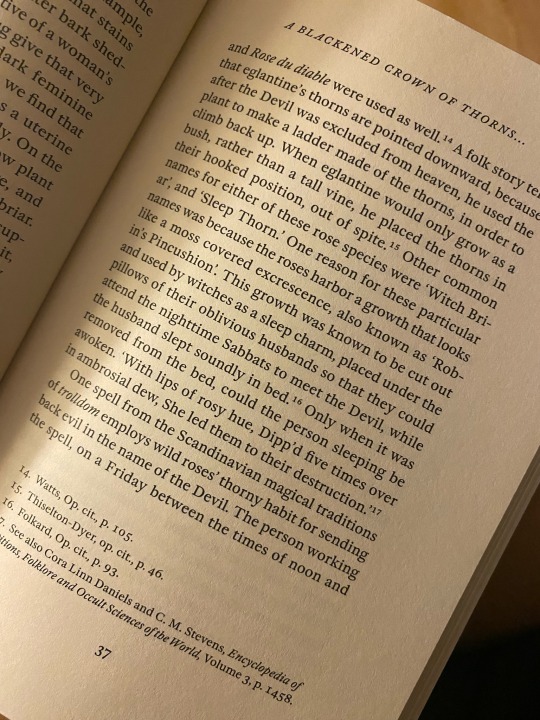
I am the land, the land is me.
I don’t own it, to it I owe all.
To it my body will return, the tithe paid.
I’m not rolling hills of heather, white chalk cliffs, the monk’s island nor the azure coast. The memories of these places echo distantly in my blood, sung alive by my ancestors shades. Part of me they’ll always be; yet it’s not who I am. Not what I am.
I’m craggy shores, dull-jade waves bearing down upon the tired rocks. I am musky pine forests veiled in mist. Sun-venerating oaks hugging the shoreline. Bleeding alders in damp ground swelling. Proud maples sustaining generation upon generation with their boiled blood. Death-grey clay, exposed by running spring.
I am the kudzu, the itching moth, the knotweed, the Norway maple, the ivy wrecking havoc upon the land. My surname and light skin proof of a genocide ongoing. I am my ancestors sins; the specter of the Old Growth forests, their grief hanging over the land like a fog. Every interaction with The Land tinged with sadness, loss.
I am my maternal side’s copper curls. Melusine’s pride. Ave Landry! Ave Gauthier! Forebears mine.
I am my paternal side’s grief. The end result of decades of cultural warfare. The Jesuits stole our name….my hair will not be cut.
Never will I libate these glacier carved valleys with booze.
I am the plantain, learning a kinder way. The sumac reclaiming the orchard.
My Februarys, my Marches aren’t snow drops and daffodils peaking through the frozen ground. They’re steely skies and walls of sleet. Bloodroot heralds winters wane; not Brigid’s flower.
My June isn’t fields of poppies, it’s seas of crimson staghorn blooms skyward reaching.
My augusts aren’t golden shafts of wheat, swaying in summer’s last breaths; they’re explosions of neon-violet and honey-yellow. Corn ripening on the vine, supporting the climbing bean. The cicadas song reverberating.
Old Michaelmas marks harvest’s end, October potatoes long buried in soils darkness finally exhumed. The Devil his Rosy Briar to ascend and plunge.
With Novembers first snows the Dead come in.
I’ll never process around a standing stone nor know what it is to live and eat off the land my dead lay in. Finally, I’m learning to be at peace with this. To love and know the land I live on. I’ll always be a stranger here, a guest. I hope to be a good one.
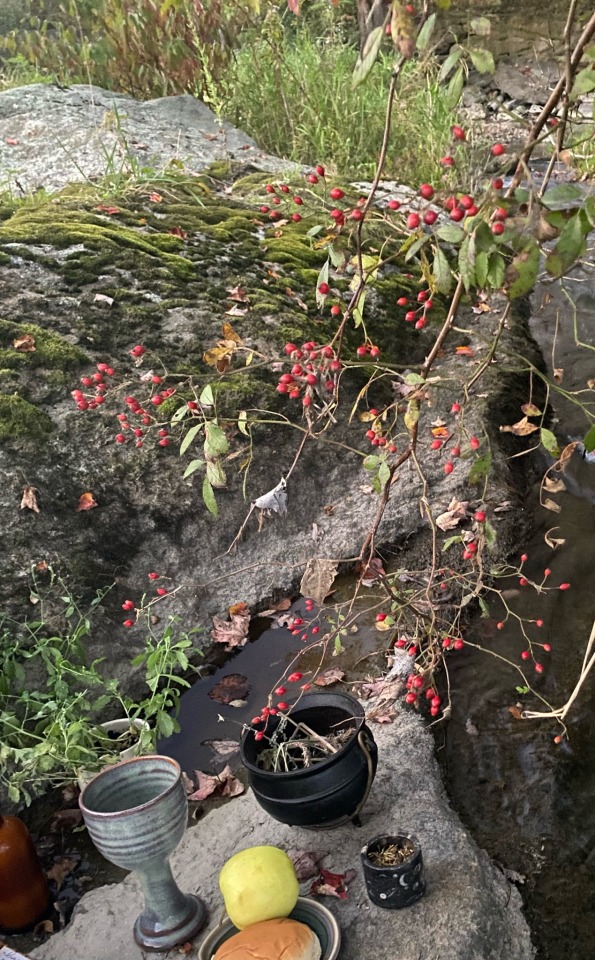
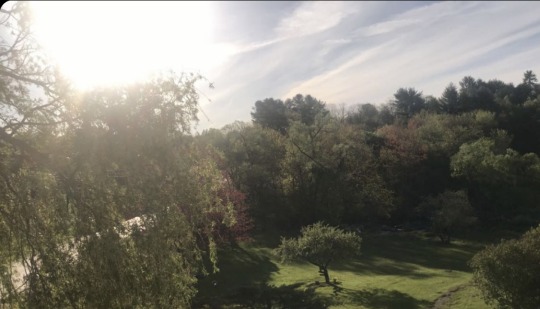
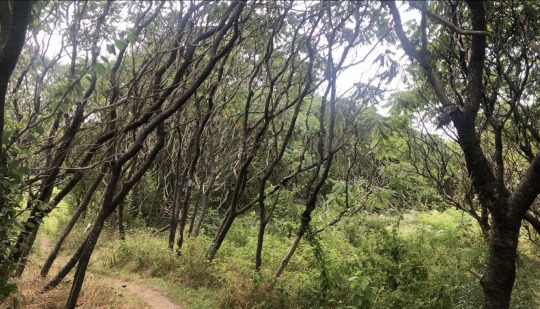
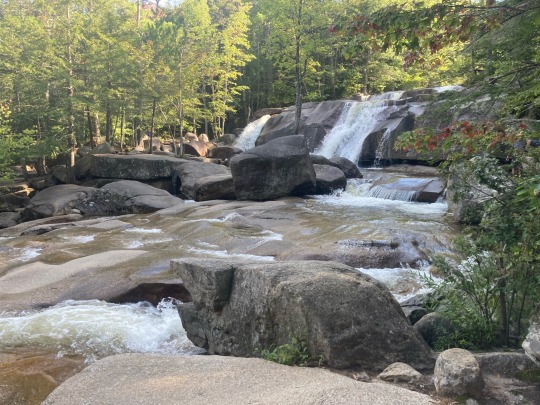
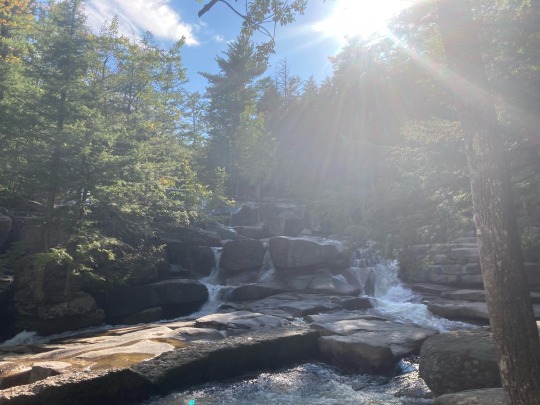
#folk magic#tradcraft#traditional witchcraft#witch#folklore#magic#magick#traditional craft#witchcraft#occult#animism#animist#animistic#animists#witches#indigenous#reparations#Michaelmas#native plants#invasive plants#ancesters#ancestry#ancestral veneration#American witch#American witchcraft#Daniel schulke#traditional American witchcraft#American traditional witchcraft#Corrine Boyer#poetry
109 notes
·
View notes
Text
Plants for The Buried
Crab grass (Digitaria)
Wood sorrel (Oxalis)
Peppermint (Mentha × piperita)
Chickweed (Stellaria media)
Dandelion (Taraxacum officinale)
Canada Thistle (Cirsium arvense)
Bindweed (Convolvulus arvensis)
White Clover (Trifolium repens)
Nutsedge (Cyperus rotundus)
Japanese knotweed (Reynoutria japonica)
Lambsquarters (Chenopodium album)
Quackgrass (Elymus repens)
Curly dock (Rumex crispus)
Purslane (Portulaca oleracea)
Creeping charlie/Ground-ivy (Glechoma hederacea)
Broadleaf plantain (Plantago major)
Dove weed (Croton setiger)
Black medic (Medicago lupulina)
Spear thistle (Cirsium vulgar)
Ragweed (Ambrosia artemisiifolia)
Asiatic dayflower (Commelina communi)
Poison Sumac (Toxicodendron vernix)
Stinging Nettle (Urtica dioica)
Wild Madder (Galium mollugo)
#og.txt#popculture magic#paganism#pop culture paganism#tma paganism#tma pcp#the magnus archives#tma#the buried#the forever deep below
18 notes
·
View notes
Text
Dark Reflections
I'e wanted to write this for so long! I even have this published on AO3 if any of you prefer reading fics there!
Gene- Light Horror
Tw- mention of needle
Wordcount- 1,345 words
AO3 Link Here
The moon hung high over the grounds of the Ministry, the crisp autumn air chilling any surface it touched. Fall was here, and the Minsitry was busy preparing the needed rituals only possible when the veil between the living and dead was at its weakest. Normally, a certain Cardinal would be assisting with these rituals, but his attention was brought away by the former Papa he was following.
"Papa Primo," Copia began as he carried an old, silver-lined mirror in his arms, "Why exactly do you need this?" He asked while straining to hold the old mirror.
"You'll see," Primo answered, "You said Sister Imperator and Papa Nihil had chosen you as the next Papa?"
"Si," Copia nodded.
Primo nodded, leading Copia into his garden of death. Copia knew immediately how important this ritual must be for Primo to allow him into his precious garden. He looked at the plants around him, the bright crimson leaves of red sumac, twisting vines of poison oak and ivy wrapping around the trunk of a manchineel tree, even the clusters of Angel's Trumpet hung from the well-maintained potted plant that Primo needed to bring to his greenhouse.
Speaking of the greenhouse, Copia tensed, seeing Primo open the door into the large glass and iron structure. "Inside, before someone sees us," Primo instructed, and Copia knew better than to hesitate. Inside the heated greenhouse were even more poisonous plants. Blooming white, pink, and red foxglove mixed with oleanders. Wistaria hung from the support beams, brushing gently against the bushes of deadly nightshade. Copia swallowed hard, seeing the assortment of deadly plants, and jumped when Primo placed a hand on his shoulder.
"Just don't touch anything, and you'll be ok." And with that, Primo led the way to the small sunroom attached to the back wall of the greenhouse. The sunroom was cleaned beforehand; a broom and dustpan were still leaning against the wall by a full compost bin. The furniture had also been moved; the chairs that were normally around the iron tea table were stacked neatly to the side. "Set the mirror down here," Primo gestured to the table as he walked to a small cart filled with garden supplies.
Copia did as instructed, setting the old mirror down on the table, wincing as he stretched his aching fingers out. When he glanced over at Primo, he saw he had a small candle and lighter in his hand, placing them on the table.
"Breathe on the mirror, make sure it fogs."
'Huh,' Copia thought to himself, 'Odd request.' But the Cardinal did as he was told. Breathing on the mirror until he saw a small patch of fog form on the smooth surface. He then stepped back, watching Primo do the same, fogging the mirror with his breath. "Papa, what ritual is this exactly?" the Cardinal asked worriedly.
"The Dark Reflection," Primo answered, "I performed this ritual the night I was to become Papa, as well for Secondo and Terzo."
Copia listened with a slight frown. He had heard of this ritual, a game of cat and mouse with the fates in exchange for years of good luck. "Are you sure this is safe?" He asked, "This isn't exactly the best ritual to perform for good luck."
"It'll be ok," Primo assured as he lit the candle, "I have completed this ritual many times, and once it's complete come morning, you'll have the fates on your side." He stated with a smile before bringing the flickering flame to the mirror's surface, holding it there until it burnt the surface, a black mark scaring the surface.
"Once I break this mirror, you keep moving all night. Ok?"
"Yes, Papa."
Primo nodded, grabbing the small hammer he kept within his gardening cart for when he needed to drive stakes in to support his saplings. The sound of glass shattering broke the silence of the greenhouse. It only took one strike to break the glass, its shards scattering across the table. Once the mirror was destroyed, Primo nodded to Copia, letting the Cardinal scamper out of his greenhouse of death.
The eldest of the Emeritus brothers then got to work cleaning up the broken mirror. He was in no hurry, even though he knew the energy from it would linger. Quietly, he swept up the shards of glass into the dustpan. As he cleaned, he felt the suffocating energy around the glass shards slowly evaporate. He then dumped the glass shards into a nearby bin, setting the broom and dustpan down before walking from his greenhouse and locking the doors behind him.
Smiling, he breathed in the chilly autumn night air. He knew tonight he'd get no sleep. He planned on simply enjoying the night reading within the library, like when he would perform the ritual for his brothers. He was always safe there.
"Fratellone," A voice called to him, making Primo pause and look over, seeing his youngest brother. "Did you forget it's game night tonight? Secondo and I have been looking all over for you!" Terzo smiled as he approched Primo.
"Ah, right," Primo nodded, "Thank you for reminding me," he chuckled. When the two started walking down the hall, they talked, "So which game is it tonight?"
"Secondo insisted on uno," Terzo answered, "I don't know why; he's awful at it," he teased with a snicker that got Primo to chuckle as well. "I also have good news too," the younger man added.
"Oh?"
"Sister says we'll be returning to the road. Full regalia and all."
Primo was caught off guard by that, "Are you sure?"
"Si, she told me herself."
Primo had a hard time believing that, having seen the screaming matches Terzo would get into with Sister after he was dragged off-stage and his relationship with Omega was discovered. He didn't dwell on it long, perking up when they reached the brothers' game room. He wasn't expecting to see Special Ghoul standing at the doorway as a silent guard.
When he glanced at Terzo for an explanation, his brother frowned, stepping into the game room while grumbling, "Sister replaced my Omega with him." Which made Primo simply nod in acknowledgment.
"About time you two showed up," Secondo spoke from the table he was sitting at. "What took you so long?"
"The Cardinal and I needed to perform a ritual," Primo stated as he sat down.
"You actually performed that mirror ritual with him?" Terzo frowned, "He's not even part of the bloodline."
"Bloodline or not, he's still chosen to be the next Papa. I want to at least ensure luck is on his side," Primo explained before glancing around, "Where's Alpha? He's normally by your side."
"He's training Dewdrop for the next tour," Secondo answered, "Been pulling double to make sure he's ready."
"So, the Clergy approved the transition?" Primo frowned in worry as Terzo sat at the table next.
"Like hell they did! They aren't touching my water ghoul," He frowned while Secondo dealt out the cards.
"So, he's grown on you, fratellino?" Primo smiled as he picked up his cards.
"Si, he's not my Mist ghoulette, but he's a perfect water ghoul," Terzo bragged.
"That's enough talk on that. What rules are we playing?" Secondo interjected, "Any bets?"
"You looking to lose again, Spooky Pitbull?" Terzo taunted with a smug smirk.
"No, I intend on winning my money back," Secondo stated before placing a green card on the table, "Your move."
Primo smiled as he watched his two little brothers compete against each other, the pile of discarded cards growing as the night stretched on. The game dragged on into the night as the brothers laughed and taunted each other. Blissfully unaware that the ghoul instructed to guard the room was given an additional order from his real master. The glint of the needle tucked away in his sleeve caught the light, shining in the moonlight before the ghoul stepped into the room. He paused for a moment, ensuring that no one was watching, and then silently slipped inside, closing the door behind him.
#the band ghost#ghost band#ghost bc#my post#my fic#papa terzo#papa emeritus iii#papa emeritus terzo#papa copia#papa emeritus iv#papa emeritus copia#papa emeritus i#papa primo#papa emeritus primo#papa secondo#papa emeritus ii#papa emeritus secondo#special ghoul
7 notes
·
View notes
Text
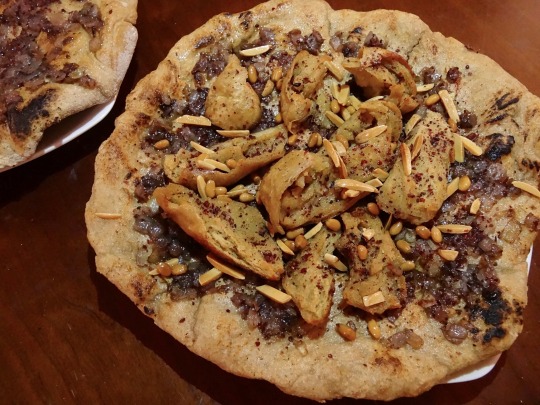

[ID: Two large flatbreads. The one in the center is topped with bright purple onions, faux chicken, fried nuts, and coarse red sumac; the one at the side is topped with onions and sumac. Second image is a close-up. End ID]
مسخن / Musakhkhan (Palestinian flatbread with onions and sumac)
Musakhkhan (مُسَخَّن; also "musakhan" or "moussakhan") is a dish historically made by Palestinian farmers during the olive harvest season of October and November: naturally leavened flatbread is cooked in clay ovens, dipped in plenty of freshly pressed olive oil, and then covered with oily, richly caramelized onions fragrant with sumac. Modern versions of the dish add spiced, boiled and baked chicken along with toasted or fried pine nuts and almonds. It is eaten with the hands, and sometimes served alongside a soup made from the stock produced by boiling the chicken. The name of the dish literally means "heated," from سَخَّنَ "sakhkhana" "to heat" + the participle prefix مُـ "mu".
I have provided instructions for including 'chicken,' but I don't think the dish suffers from its lack: the rich, slightly sour fermented wheat bread, the deep sweetness of the caramelised onions, and the true, clean, bright expressions of olive oil and sumac make this dish a must-try even in its original, plainer form.
Musakhkhan is often considered to be the national dish of Palestine. Like foods such as za'tar, hummus, tahina, and frika, it is significant for its historical and emotional associations, and for the way it links people, place, identity, and memory; it is also understood to be symbolic of a deeply rooted connection to the land, and thus of liberation struggle. The dish is liberally covered with the fruit of Palestinian lands in the form of onions, olive oil, and sumac (the dried and ground berries of a wild-growing bush).
The symbolic resonance of olive oil may be imputed to its history in the area. In historical Palestine (before the British Mandate period), agriculture and income from agricultural exports made up the bulk of the economy. Under مُشَاعْ (mushā', "common"; also transliterated "musha'a") systems of land tenure, communally owned plots of land were divided into parcels which were rotated between members of large kinship groups (rather than one parcel belonging to a private owner and their descendants into perpetuity). Olive trees were grown over much of the land, including on terraced hills, and their oil was used for culinary purposes and to make soap; excess was exported. In the early 1920s, Palestinian farmers produced 5,000 tons of olive oil a year, making an average of 342,000 PL (Palestinian pounds, equivalent to pounds sterling) from exports to Egypt alone.
During the British Mandate period (from 1917 to 1948, when Britain was given the administration of Palestine by the League of Nations after World War 1), acres of densely populated and cultivated land were expropriated from Palestinians through legal strongarming of and direct violence against, including killing of, فَلّاَحين (fallahin, peasants; singular "فَلَّاح" "fallah") by British troops. This continued a campaign of dispossession that had begun in the late 19th century.
By 1941, an estimated 119,000 peasants had been dispossessed of land (30% of all Palestinian families involved in agriculture); many of them had moved to other areas, while those who stayed were largely destitute. The agriculturally rich Nablus area (north of Jerusalem), for example, was largely empty by 1934: Haaretz reported that it was "no longer the town of gold [i.e., oranges], neither is it the town of trade [i.e., olive oil]. Nablus rather has become the town of empty houses, of darkness and of misery". Farmers led rebellions against this expropriation in 1929, 1933, and 1936-9, which were brutually repressed by the British military.
Despite the number of farmers who had been displaced from their land by European Jewish private owners and cooperatives (which owned 24.5% of all cultivated land in Palestine by 1941), the amount of olives produced by Palestinians increased from 34,000 tons in 1931 to 78,300 in 1945, evidencing an investment in and expansion of agriculture by indigenous inhabitants. Thus it does not seem likely that vast swathes of land were "waste land," or that the musha' system did not allow for "development"!
Imprecations against the musha' system were nevertheless used as justification to force Palestinians from their land. After various Zionist organizations and militant groups succeeded in pushing Britain out of Palestine in 1948—clearing the way for hundreds of thousands of Palestinians to be dispossessed or killed during the Nakba—the Israeli parliament began constructing a framework to render their expropriation of land legal; the Cultivation of Waste Lands Law of 1949, for example, allowed the requisition of uncultivated land, while the Absentees’ Property Law of 1950 allowed the state to requisition the land of people it had forced from their homes.
Israel profited from its dispossession of millions of dunums of land; 40,000 dunums of vineyards, 100,000 dunums of citrus groves, and 95% of the olive groves in the new state were stolen from Palestinians during this period, and the agricultural subsidies bolstered by these properties were used to lure new settlers in with promises of large incomes.
It also profited from the resulting "de-development" of the Palestinian economy, of which the decline in trade of olive oil furnishes a striking example. Palestinian olive farmers were unable to compete with the cheaper oils (olive and other types) with which Zionist, capital-driven industry flooded the market; by 1936, the 342,000 PL in olive oil exports of the early 1920s had fallen to 52,091 PL, and thereafter to nothing. While selling to a Palestinian captive market, Israel was also exporting the fruits of confiscated Palestinian land to Europe and elsewhere; in 1949, olives produced on stolen land were Israel's third-largest export. As of 2014, 12.9% of the olives exported to Europe were grown in the occupied West Bank alone.
This process of de-development and profiteering accelerated after Israel's military seizure of the West Bank and Gaza in 1967. In 1970, agriculture made up 34% of the GDP of the West Bank, and 31% of that of Gaza; in 2000, it was 16% and 18%, respectively. Many of those out of work due to expropriated or newly unworkable land were hired as day laborers on Israeli farms.
Meanwhile, Palestinians (and Israeli Palestinians) continued to plant and cultivate olives. The fact that Palestinians do not control their own water supplies or borders and may expect at any time to be barred by the military from harvesting their fields has discouraged investment and led to risk aversion (especially since the outmoding of the musha' system, which had minimized individual risk). In this environment, olive trees are attractive because they are low-input. They can subsist on rainwater (Israel monopolizes and poisons much of the region's water, and heavily taxes imports of materials that could be used to build irrigation systems), and don't require high-quality soil or daily weeding. Olive trees, unlike factories and agricultural technology, don't need large inputs of capital that stand to be wasted if the Israeli military destroys them.
Olive trees are therefore the chosen crop when proving a continued use of land in order to prevent the Israeli military from expropriating it under various "waste" or "absentee" land laws. Palestinians immediately plant olive seedlings on land they have been temporarily forced from, since even land that has lain fallow due to status as a military closed zone can be appropriated with this justification. The danger is so pressing that Palestinian agronomists encouraged this habit (as of 1993), despite the fact that Israeli competition and continual planting had lowered olive crop prices, and despite the decline in soil quality that results from never allowing land to lie fallow. In more recent years, olive trees have yielded primary or supplementary income for about 100,000 Palestinian families, producing up to 191 million USD in value in good years (including an average of 17,000 tons of olive oil yearly between 2001 and 2009).
Israeli soldiers and settlers have famously uprooted, vandalized, razed, and burned millions of these olive trees, as well as using military outposts to deny Palestinian farmers access to their olive crops. It prefers to restrict Palestinians to annual crops, such as vegetables and grains, and eliminate competition in permanent crops, such as fruit trees.
This targeting of olive trees increases during times of intensified conflict. During the currently ongoing olive harvest season (November 2023), Gazan olive farmers have reported being targeted by Israeli war planes; some farmers in the West Bank have given up on harvesting their trees altogether, due to threats issued by organized networks of settlers that they would kill anyone seen making the attempt.
The rootedness of olive trees in the history of Palestine gives them weight as a symbol of homeland, culture, and the fight for liberation. Palestinian olive harvest festivals, typically celebrated in October with singing, dancing, and eating, have inspired similar events elsewhere in the world, aimed at sharing Palestinian food and culture and expressing solidarity with those living under occupation.
Support Palestinian resistance by calling Elbit System’s (Israel’s primary weapons manufacturer) landlord, donating to Palestine Action’s bail fund, and donating to the Bay Area Anti-Repression Committee bail fund.
Ingredients:
For the dish:
2 pieces taboon bread, preferably freshly baked
2 large or 3 medium yellow onions (480g)
1 cup first cold press extra virgin olive oil (زيت زيتون البكر الممتاز)
1 Tbsp coarsely ground Levantine sumac (سماق شامي / sumaq shami), plus more to top
Ground black pepper
For the chicken (optional):
500g chicken substitute
5 green cardamom pods, or 1/4 tsp ground cardamom
4 cloves, or pinch ground cloves
1 Mediterranean bay leaf
1 Tbsp ground sumac
For the nut topping (optional):
2 Tbsp slivered almonds
2 Tbsp pine nuts
Neutral oil, for frying
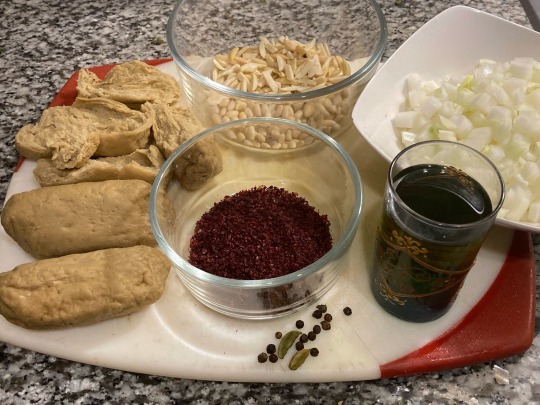
Notes on ingredients:
Use the best olive oil that you can. You will want oil that has some opacity to it or some deposits in it. I used Aleppo brand olive oil (7 USD a liter at my local halal grocery).
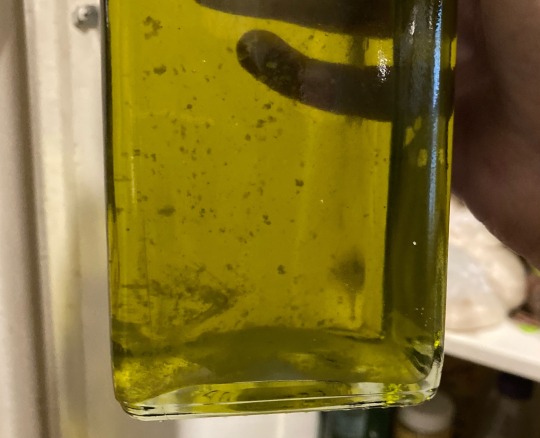
If you want to replace the taboon bread with something less laborious, I would recommend something that mimics the rich, fermented flavor of the traditional, whole-wheat, naturally leavened bread. Many people today make taboon bread with white flour and commercial yeast—which you might mimic by using storebought naan or lavash, for example—but I think the slight sourness of the flatbread is a beautiful counterpoint to the brightness of the sumac and the sweetness of the caramelized onions. I would go with a sourdough pizza crust or something similar.
Your sumac should be coarsely ground, not finely powdered; and a deep, rich red, not pinkish in color (like the pile on the right, not the one on the left).

For this dish, a whole chicken is usually first boiled (perhaps with spices including bay leaves, cardamom, and cloves) and then baked, sometimes along with some of the oil from frying the onions. I call for just frying or baking instead; in my opinion, boiling often has a negative effect on the texture of meat substitutes.
Instructions:
For the onions:
1. Heat a cup of olive oil in a large skillet or pot. Fry onions on medium-low, stirring often, for 10 minutes or until translucent.

2. Add 1 Tbsp sumac and a few cracks of black pepper and reduce to low. Cook for another 30 minutes, stirring occasionally, until onions are sweet, reduced in volume, and pinkish in color.
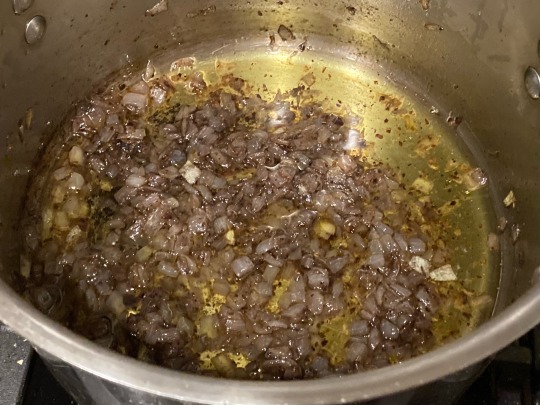
For the chicken:
1. Briefly toast and finely grind spices except for sumac (cardamom, cloves, and bay leaf). Filter with a fine mesh sieve. Dip 'chicken' into the pot in which you fried the onions to coat it with olive oil, then rub spices (including sumac) onto the surface.
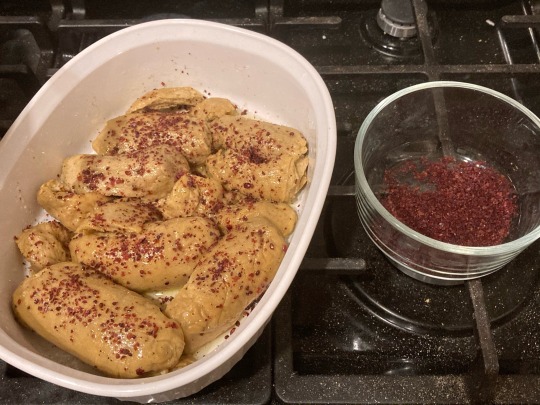
2. Sear chicken in a dry skillet until browned on all sides; or bake, uncovered, in the top third of an oven heated to 400 °F (200 °C) until browned.
For the nut topping:
1. Heat a neutral oil on medium in a small pot or skillet. Add almonds and fry for 2 minutes, until just starting to take on color. Add pine nuts and fry until both almonds and pine nuts are golden brown. Remove with a slotted spoon.
To assemble:
1. Dip each flatbread in the olive oil used to fry the onions, then spread onions over the surface.
Some cooks dip the bread entirely into oil; others press it lightly into the surface of the oil in the pot on both sides, or one side; a more modern method calls for mixing the olive oil with chicken broth to lighten it. Consult your taste. I think the bread from my taboon recipe stands up well to being pressed into the oil on both sides without tearing or becoming soggy.
2. Top flatbread with chicken and several large pinches more sumac. Bake briefly in the oven (still heated to 400 °F / 200 °C), or broil on low, for 3-5 minutes, until the sumac and the surface of the bread have darkened a shade.
3. Top with fried nuts.
Musakhkhan is usually eaten by ripping the chicken into bite-sized pieces, tearing off a bit of bread, and eating the chicken using the bread.
Some cooks make a layered musakhkhan, adding two to three pieces of bread covered with onions on top of each other before topping the entire construction with chicken and pine nuts.
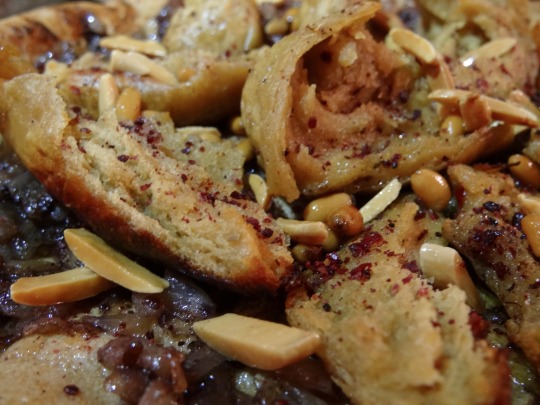
820 notes
·
View notes
Note
🫐🥦🥒🫑🌶️🥕?
(Or, are you growing anything this summer?)
Hello friend!
I am! The strawberries have come and gone, though I put in some wild wood strawberries as a ground cover this spring, and they are vigorously spreading and I may regret that. But they make the cutest, tiniest strawberries. Right now we are in Raspberry Week, and Blueberry Month is starting. I have one raspberry patch, one vigorously happy highbush blueberry, and one less happy but established highbush blueberry. And I put four more in this spring. I work on the "put it in and see if it makes it" theory and I have this place where all the things keep giving up, so if the shrubberies make it, at least the space will be filled with something three dimensional. If this dies, I might try native sumac, which the native plant nursery claims grows pretty much anywhere.
ANYWAY, we had to rebuild the herb garden so none of my established perennials like oregano made it, and I'm starting from scratch there, but I have a gigantic decade-old rhubarb and tomatoes and my pumpkin graveyard is now the necromantic most sincere pumpkin patch!
13 notes
·
View notes
Text
fun
also on youtube: 00:31:46
I was in the midst of the fourth draft of my doctorate thesis when Aunt Matilda's telegram came. It could not have come at a worse time. The deadline for my thesis was four days away and there was a minimum of five days of hard work to do on it yet. I was working around the clock.
If it had been a telegram informing me of her death I could not have taken time out to attend the funeral. If it had been a telegram saying she was at death's door I'm very much afraid I would have had to call the hospital and order them to keep her alive a few days longer.
Instead, it was a tersely worded appeal. ARTHUR STOP COME AT ONCE STOP AM IN TERRIBLE TROUBLE STOP DO NOT PHONE STOP AUNT MATILDA.
So there was nothing else for me to do. I laid the telegram aside and kept on working on my thesis. That is not as heartless as it might seem. I simply could not imagine Aunt Matilda in terrible trouble. The end of the world I could imagine, but not Aunt Matilda in trouble.
She was the classic flat-chested ageless spinster living alone in the midst of her dustless bric-a-brac and Spode in a frame house of the same vintage as herself at the edge of the classic small town of Sumac, near the southwest corner of Wisconsin. I had visited her for two days over a year ago, and she had looked exactly the same as she had when I stayed with her when I was six all summer, and there was no question but what she would some day attend my funeral when I died of old age, and she would still look the same as always.
There was no conceivable trouble of terrestrial origin that could touch her—or would want to. And, as it turned out, I was right in that respect.
I was right in another respect too. By finishing my thesis I became a Ph.D. on schedule, and if I had abandoned all that and rushed to Sumac the moment I received the telegram it could not have materially altered the outcome of things. And Aunt Matilda, hanging on the wall of my study, knitting things for the Red Cross, will attest to that.
You, of course, might argue about her being there. You might even insist that I am hanging on her wall instead. And I would have to agree with you, since it all depends on the point of view and as I sit here typing I can look up and see myself hanging on her wall.
But perhaps I had better begin at the beginning when, with my thesis behind me, I arrived on the 4:15 milk run, as they call the train that stops on its way past Sumac.
I was in a very disturbed state of mind, as anyone who has ever turned in a doctorate thesis can well imagine. For the life of me I couldn't be sure whether I had used symbol or token on line 7, sheet 23, of my thesis, and it was a bad habit of mine to unconsciously interchange them unpredictably, and I knew that Dr. Walters could very well vote against acceptance of my thesis on that ground alone. Also, I had thought of a much better opening sentence to my thesis, and was having to use will power to keep from rushing back to the university to ask permission to change it.
I had practically no sleep during the fourteen-hour run, and what sleep I did have had been interrupted by violent starts of awaking with a conviction that this or that error in the initial draft of my thesis had not been corrected by the final draft. And then, of course, I would have to think the thing through and recall when I had made the correction, before I could go back to sleep.
So I was a wreck, mentally, if not physically, when I stepped off the train onto the wooden depot platform that had certainly been built in the Pleistocene Era, with my oxblood two-suiter firmly clutched in my left hand.
With snorts of steam and the loud clanking of loose drives, the train got under way again, its whistle wailing mournfully as the last empty coach car sped past me and retreated into the distance.
As I stood there, my brain tingling with weariness, and listened to the absolute silence of the town triumph over the last distant wail of the train whistle, I became aware that something about Sumac was different.
What it was, I didn't know. I stood where I was a moment longer, trying to analyze it. In some indefinable way everything looked unreal. That was as close as I could come to it, and of course having pinned it down that far I at once dismissed it as a trick of the mind produced by tiredness.
I began walking. The planks of the platform were certainly real enough. I circled the depot without going in, and started walking in the direction of Aunt Matilda's, which was only a short eight blocks from the depot, as I had known since I was six.
The feeling of the unreality of my surroundings persisted, and with it came another feeling, of an invisible pressure against me. Almost a resentment. Not only from the people, but from the houses and even the trees.
Slowly I began to realize that it couldn't be entirely my imagination. Most of the dozen or so people I passed knew me, and I remembered suddenly that every other time I had come to Aunt Matilda's they had stopped to talk with me and I had had to make some excuse to escape them. Now they were behaving differently. They would look at me absently as they might at any stranger walking from the direction of the depot, then their eyes would light up with recognition and they would open their lips to greet me with hearty welcome.
Then, as though they just thought of something, they would change, and just say, "Hello, Arthur," and continue on past me.
It didn't take me long to conclude that this strange behavior was probably caused by something in connection with Aunt Matilda. Had she perhaps been named as corespondent in the divorce of the local minister? Had she, of all people, had a child out of wedlock?
Things in a small town can be deadly serious, so by the time her familiar frame house came into view down the street I was ready to keep a straight face, no matter what, and reserve my chuckles for the privacy of her guest room. It would be a new experience, to find Aunt Matilda guilty of any human frailty. It was slightly impossible, but I had prepared myself for it.
And that first day her behavior convinced me I was right in my conclusion.
She appeared in the doorway as I came up the front walk. She was breathing hard, as though she had been running, and there was a dust streak on the side of her thin face.
"Hello, Arthur," she said when I came up on the porch. She shook my hand as limply as always, and gave me a reluctant duty peck on the cheek, then backed into the house to give me room to enter.
I glanced around the familiar surroundings, waiting for her to blurt out the cause of her telegram, and feeling a little guilty about not having come at once.
I felt the loneliness inside her more than I ever had before. There was a terror way back in her eyes.
"You look tired, Arthur," she said.
"Yes," I said, glad of the opportunity she had given me to explain. "I had to finish my thesis and get it in by last night. Two solid years of hard work and it had to be done or the whole thing was for nothing. That's why I couldn't come four days ago. And you seemed quite insistent that I shouldn't call." I smiled to let her know that I remembered about party lines in a small town.
"It's just as well," she said. And while I was trying to decide what the antecedent of her remark was she said, "You can go back on the morning train."
"You mean the trouble is over?" I said, relieved.
"Yes," she said. But she had hesitated.
It was the first time I had ever seen her tell a lie.
"You must be hungry," she rushed on. "Put your suitcase in the room and wash up." She turned her back to me and hurried into the kitchen.
I was hungry. The memory of her homey cooking did it. I glanced around the front room. Nothing had changed, I thought. Then I noticed the framed portrait of my father and his three brothers was hanging where the large print of a basket of fruit used to hang. The basket of fruit picture was where the portrait should have been, and it was entirely too big a picture for that spot. I would never have thought Aunt Matilda could tolerate anything out of proportion. And the darker area of wallpaper where the fruit picture had prevented fading stood out like a sore thumb.
I looked around the room for other changes. The boat picture that had hung to the right of the front door was not there. On the floor under where it should have been I caught the flash of light from a shard of glass. Next to it, the drape framing the window was not hanging right.
On impulse I went over and peeked behind the drape. There, leaning against the wall, was the boat picture with fragments of splintered glass still in it.
From the evidence it appeared that Aunt Matilda had either been trying to hang the picture where it belonged, or taking it down, and it had slipped out of her hands and fallen, and she had hidden it behind the drape and hastily swept up the broken glass.
But why? Even granting that Aunt Matilda might behave in such an erratic fashion (which was obvious from the evidence), I couldn't imagine a sensible reason.
It occurred to me, facetiously, that she might have gone in for pictures of musclemen, and, seeing me coming up the street, she had rushed them into hiding and brought out the old pictures.
That could account for the evidence—except for one thing. I hadn't dallied. She could not possibly have seen me earlier than sixty seconds before I came up the front walk.
Still, the telegrapher at the depot could have called her and told her I was here when he saw me get off the train.
I shrugged the matter off and went to the guest room. It too was the same as always, except for one thing. A picture.
It was a color photograph of the church, taken from the street. The picture was in a frame, but without glass over it, and was about eighteen inches wide and thirty high.
It was a very good picture. Very lifelike. There was a car parked at the curb in front of the church, and someone inside the car smoking a cigarette, and it was so real I would have sworn I could see the streamer of smoke rising from the cigarette moving.
The odor of good food came from the kitchen, reminding me to get busy. I opened my two-suiter and took out my toilet kit and went to the bathroom.
I shaved, brushed my teeth, and combed my hair. Afterward I popped into my room just for a second to put my toilet kit on the dresser, and hurried to the dining room.
Something nagged at the back of my mind all the time I was eating. After dinner Aunt Matilda suggested I'd better get some sleep. I couldn't argue. I was already asleep on my feet. Her fried chicken and creamed gravy and mashed potatoes had been an opiate.
I didn't even bother to hang up my clothes. I slipped into the heaven of comfort of the bed and closed my eyes. And the next minute it was morning.
Getting out of bed, I stopped in mid motion. The picture of the church was no longer on the wall. And as I stared at the blank spot where it had been, the thing that had nagged me during dinner last night finally leaped into consciousness.
When I had dashed into the room and out again last night on the way to the dining room I had glanced briefly at the picture and something had been different about it. Now I knew what had been different.
The car had no longer been in front of the church.
I lit a cigarette and sat on the edge of the bed. I thought about that picture, and simply could not bring myself to believe the accuracy of that fleeting impression.
Aunt Matilda had slipped into my room and removed the picture while I slept. That was obvious. Why had she done that? The fleeting impression that I couldn't be positive about would give her a sensible reason.
I studied my memory of that picture as I had closely studied it. It had been a remarkable picture. The more I recalled its details the more remarkable it became. I couldn't remember any surface gloss or graining to it, but of course I had not been looking for such things. Only an expert photographer would notice or recognize such technical details.
My thoughts turned in the direction of Aunt Matilda—and her telegram. Her source of income, I knew, was her part of the estate of my grandfather, and amounted to something like thirty thousand dollars. I knew that she was terrified of touching one cent of the capital, and lived well within the income from good sound stocks.
I took her telegram out of the pocket of my coat which was hanging over the back of a chair. COME AT ONCE STOP AM IN TERRIBLE TROUBLE ... The only kind of terrible trouble Matilda could be in was if some swindler talked her out of some of her capital! And that definitely would not be easy to do. I grinned to myself at the recollection of her worrying herself sick once over what would happen to her if there was a revolution and the new government refused to honor the old government bonds.
Things began to make sense. Her telegram, then those pictures moved around in the front room, and the one she had forgotten to hide, in the guest room. If the other pictures were anything like it, I could see how Aunt Matilda might cash in on part of her securities to invest in what she thought was a sure thing.
But sure things are only as good as the people in control of them. Many a sure thing has been lost to the original investors by stupid decisions leading to bankruptcy, and many a seemingly sure thing has fleeced a lot of innocent victims.
Slowly, as I thought it out, I became sure that that was what had happened.
Then why Aunt Matilda's about-face, hiding the pictures and telling me to go back to Chicago? Had she threatened whoever was behind this, and gotten her money back? Or had she again become convinced that her financial venture was sound?
In either case, why was she trying to keep me from knowing about the pictures?
I made up my mind. Whether Aunt Matilda liked it or not, I was going to stay until I got to the bottom of things. What Aunt Matilda evidently didn't realize was that no inventor who really had something would waste time trying to find backing in a place like Sumac.
Getting dressed, I decided that first on the agenda would be to find where Matilda had hidden those pictures, and get a good look at them.
That was simpler than I expected it to be. When I came out of my room I stuck my head in the kitchen doorway and said good morning to her, and she leaped to her feet to get some breakfast ready for me. It was obvious that she was anxious to get me fed and out of the house.
Then I simply took the two steps past the bathroom door to the door to her bedroom and went in. The pictures were stacked against the side of her dresser. The one of the church was the first one. It was on its side.
With a silent whistle of amazement I bent down to watch it. The car was not parked at the curb in it, but there were several children walking along, obviously on their way to school. And they were walking. Moving.
I picked up the picture. It was as heavy as it should be, but not more. A faint whisper of sound seemed to come from it. I put my ear closer and heard children's voices. I explored with my ear close to the surface, and found that the voices were loudest when my ear was closest to the one talking, as though the voices came out of the picture directly from the images!
All it needed to be perfect was a volume control somewhere. I searched, and found it behind the upper right corner of the picture. I twisted it very slowly, and the voices became louder. I turned it back to the position it had been in.
The next picture was of the railroad depot. The telegrapher and baggage clerk were going around the side of the depot towards the tracks. A freight train was rushing through the picture.
Even as I watched it in the picture, I heard the wail of a train whistle in the distance, and it was coming from outside, across town. That freight train was going through town right now.
I put the pictures back the way they had been, and stole softly from Aunt Matilda's bedroom to the bathroom, and closed the door.
"No wonder Aunt Matilda invested in this thing!" I said to my image in the mirror as I shaved.
Picture TV would make all other TV receivers obsolete! Full color TV at that! And with some new principle in stereophonic sound!
What about the fact that neither picture had been plugged into an outlet? Probably run by batteries.
What about the lack of weight? Obviously a new TV principle was involved. Maybe it required fewer circuits and less power.
What about the broadcasting end, the cameras? Permanently set up? What about the broadcast channels?
There had been ten or twelve pictures. I'd only looked at two. Was each a different scene? Twelve different broadcasting stations in Sumac?
It had me dizzy. Probably the new TV principle was so simple that all that could be taken care of without millions of dollars worth of equipment.
A new respect for Aunt Matilda grew in me. She had latched on to a money maker! It didn't hurt to know that I was her favorite nephew, either. With my Ph.D. in physics, and my aunt as one of the stockholders, I could probably land a good job with the company. What a deal!
By the time I finished shaving I was whistling. I was still whistling when I went into the kitchen for breakfast.
"You'll have to hurry, Arthur," Aunt Matilda said. "Your train leaves in forty-five minutes."
"I'm not leaving," I said cheerfully.
I went over to the bright breakfast nook and sat down, and took a cautious sip of coffee. I grunted my approval of it and looked around toward Aunt Matilda, smiling.
She was staring at me with wide eyes. She looked as haggard as though she had just heard she had a week to live.
"But you must go!" she croaked as though my not going were unthinkable.
"Nonsense, you old fox," I said. "I know a good thing as well as you do. I want to get a job with that outfit."
She came toward me with a wild expression on her face.
"Get out!" she screamed. "Get out of my house! I won't have it! You catch that train and get out of town. Do you hear?"
"But, Aunt Matilda!" I protested.
In the end I had to get out or she would have had a stroke. She was shaking like a leaf, her skin mottled and her eyes wild, as I went down the front steps with my bag.
"You get that train, do you hear?" was the last thing she screamed at me as I hurried toward Main Street.
However, I had no intention of leaving town with Aunt Matilda upset that way. I'd let her have time to cool off, then come back. Meanwhile I'd try to get to the bottom of things. A thing as big as wall TV in full color and stereophonic sound must be the talk of the town. I'd find out where they had their office and go talk with them. A career with something like that would be the best thing I could ever hope to find. And getting in on the ground floor!
It surprised me that Aunt Matilda could be so insanely greedy. I shook my head in wonder. It didn't figure.
I had breakfast at the hotel cafe and made a point of telling the waitress, who knew me, that it was my second breakfast, and that I had intended to catch the morning train back to Chicago, but maybe I wouldn't.
After I finished eating I asked if it would be okay to leave my suitcase behind the counter while I looked around a bit. She showed me where to put it so it would be out of the way.
When I paid for my breakfast I half turned away, then turned back casually.
"Oh, by the way," I said. "Where's this wall TV place?"
"This what?" she said.
"You know," I said. "Color TV like a picture you hang on a wall."
All the color faded from her face. Her eyes went past me, staring. I turned in the direction she was staring, and on the wall above the plateglass front of the cafe was a picture.
That is, there was a picture frame and a pair of dark glasses that took up most of the picture, with the lower part of a forehead and the upper part of a nose. I had noticed it once while I was eating and had assumed it was a display ad for sun glasses. Now I looked at it more closely, but could detect no movement in it. It still looked like an ad for sun glasses.
"I don't know what you're talking about," I heard the waitress say, her voice edged with fear.
"Huh?" I said, turning my head back to look at her. "Oh. Well, never mind."
I left the cafe with every outward appearance of casual innocence; but inside I was beginning to realize for the first time the possibilities and the danger that could lie in the use of this new TV development.
That had been a Big-Brother-is-Watching-you setup back there in the cafe, except that it had been a girl instead of a man, judging from the style of sun glasses and the smoothness of the nose and forehead.
I had wondered about the broadcasting end of things. Now I knew. That had been the TV "eye," and somewhere there was a framed picture hanging on the wall, bringing in everything that took place in the cafe, including everything that was said. Everything I had said, too. It was an ominous feeling.
Aunt Matilda had almost had a stroke trying to get me out of town. Now I knew why. She was caught in this thing and wanted to save me. Four days ago she had probably not fully realized the potentiality for evil of the invention, but by the time I showed up she knew it.
Well, she was right. This was not something for me to tackle. I would keep up my appearance of not suspecting anything, and catch that train Aunt Matilda wanted me to catch.
From way out in the country came the whistle of the approaching milk run, the train that would take me back to Chicago. In Chicago I would go to the F.B.I, and tell them the whole thing. They wouldn't believe me, of course, but they would investigate. If the thing hadn't spread any farther than Sumac it would be a simple matter to stop it.
I'd hurry back to the cafe and get my suitcase and tell the waitress I'd decided to catch the train after all.
I turned around.
Only I didn't turn around.
That's as nearly as I can describe it. I did turn around. I know I did. But the town turned around with me, and the sun and the clouds and the countryside. So maybe I only thought I turned around.
When I tried to stop walking it was different. I simply could not stop walking. Nothing was in control of my mind. It was more like stepping on the brakes and the brakes not responding.
I gave up trying, more curious about what was happening than alarmed. I walked two blocks along Main Street. Ahead of me I saw a sign. It was the only new sign I had seen in Sumac. In ornate Neon script it said, "PORTRAITS by Lana."
I don't know whether my feet took me inside independently of my mind or not, because I was sure that this was the place and I wanted to go in anyway.
Not much had been done to modernize the interior of the shop. I remembered that the last time I had been here it had been a stamp collector headquarters run by Mr. Mason and his wife. The counter was still there, but instead of stamp displays it held a variety of standard portraits such as you can see in any portrait studio. None of the TV portraits were on display here.
The same bell that used to tinkle when I came into the stamp store tinkled in back of the partition when I came in. A moment later the curtain in the doorway of the partition parted, and a girl came out.
How can I describe her? In appearance she was anyone of a thousand smartly dressed brunettes that wait on you in quality photograph studios, and yet she wasn't. She was as much above that in cut as the average smartly dressed girl is above a female alcoholic after a ten-day drunk. She was perfect. Too perfect. She was the type of girl a man would dream of meeting some day, but if he ever did he would run like hell because he could never hope to live up to such perfection.
"You have come to have your portrait taken?" she asked. "I am Lana."
"I thought you already had my portrait," I said. "Didn't you get it from that eye in the hotel cafe?"
"It's not the same thing," Lana said. "Through an eye you remain a variable in the Mantram complex. It takes the camera to fix you, so that you are an iconic invariant in the Mantram." She smiled and half turned toward the curtain she had come through. "Would you step this way, please?" she invited.
"How much will it cost?" I said, not moving.
"Nothing, of course!" Lana said. "Terrestrial money is of no use to me since you have nothing I would care to buy. And don't be alarmed. No harm will come to you, or anyone else." A fleeting expression of concern came over her. "I realize that many of the people of Sumac are quite alarmed, but that is to be expected of a people uneducated enough to still be superstitious."
I went past her through the curtain. Behind the partition I expected to see out-of-this-world scientific equipment stacked to the ceiling. Instead, there was only a portrait camera on a tripod. It had a long bellows and would take a plate the same size as that picture of the church I had seen.
"You see?" Lana said. "It's just a camera." She smiled disarmingly.
I went toward it casually, and suddenly I stopped as though another mind controlled my actions. When I gave up the idea I had had of smashing the camera, the control vanished.
There was no lens in the lens frame. "Where's the lens?" I said.
"It doesn't use a glass lens," Lana said. "When I take the picture a lens forms just long enough to focus the elements of your body into a Mantram fix." She touched my shoulder. "Would you sit down over there, please?"
"What do you mean by a Mantram fix?" I asked her.
She paused by the camera and smiled at me. "I use your language," she said. "In some of your legends you have the notion of a Mantram, or what you consider magical spell. In one aspect the notion is of magical words that can manipulate natural forces directly. The notion of a devil doll is a little closer. Only instead of actual substance from the subject—hair, fingernail parings, and so on—the Mantram matrix takes the detailed force pattern of the subject, through the lens when it forms. So, in your concepts, what results is an iconic Mantram. But it operates both ways. You'll see what I mean by that."
With another placating smile she stepped behind the camera and without warning light seemed to explode from the very air around me, without any source. For a brief second I seemed to see—not a glittering lens—but a black bottomless hole form in the metal circle at the front of the camera. And—an experience I am familiar with now—I seemed to rush into the bottomless darkness of that hole and back again, at the rate of thousands of times a second, arriving at some formless destination and each time feeling it take on more of form.
"There. That wasn't so bad, was it?" Lana said.
I felt strangely detached, as though I were in two places at the same time. I told her so.
"You'll get used to it," she assured me. "In fact, you will get to enjoy it. I do. Especially when I've made several prints."
"Why are you doing this?" I asked. "Who are you? What are you?"
"I'm a photographer!" Lana said. "I'm connected with the natural history museum of the planet I live on. I go to various places and take pictures, and they go into exhibits for the people to watch."
She pulled the curtain aside for me to leave.
"You're going to let me leave? Just like that?" I said.
"Of course." She smiled again. "You're free to go wherever you wish, to your aunt's or back to Chicago. I was glad to get your portrait. In return, I'll send you one of the prints. And would you like one of your aunt's? Actually, when she came in to have her picture taken it was for the purpose of sending it to you. She was my first customer. I've taken a special liking to her and given her several pictures."
"Yes," I said. "I would like one of Aunt Matilda."
When I emerged from the shop I discovered to my surprise that the train was just pulling into the depot. An urge to get far away from Sumac possessed me. I trotted to the cafe to get my bag, and when the train pulled out I was on it.
There's little more to tell. In Chicago once again, I spent a most exasperating two days trying to inform the F.B.I., the police, or anyone who would listen to me. My fingers couldn't dial the correct phone number, and at the crucial moment each time I grew tongue-tied. My last attempt was a letter to the F.B.I., which I couldn't remember to mail, and when I finally did remember I couldn't find it.
Then the express package from Sumac came. With fingers that visibly trembled I took out the two framed pictures, one of Aunt Matilda in the process of dusting the front room. All of her pictures that she had hidden from me were back in their places on the walls. While I watched her move about, she went into the sewing room, and there I saw a picture on the wall that looked familiar.
It was of me, an opened express package at my feet, a framed picture held in my hands, and I was staring at it intently.
In the picture I was holding, Aunt Matilda looked in my direction and waved, smiling in the prim way she smiles when she is contented. I understood. She had me with her now.
I laid the picture down carefully, and took the second one out of the box.
It was not a picture at all, it was a mirror!
It couldn't be anything except a mirror. And yet, suddenly, I realized it wasn't. The uncanny feeling came over me that I had transposed into the mirror and was looking out at myself. Even as I got that feeling I shifted and was outside the mirror looking at my image.
I found that I could be in either place by a sort of mental shift, something like staring at one of the geometrical optical illusions you can find in any psychology textbook in the chapter on illusions, and seeing it become something else.
It was strange at first, then it became fun, and now, as I write this, it is a normal thing. My portrait is where it should be—on the medicine cabinet in the bathroom, where the mirror used to be.
But I can transpose to any of the copies of my portrait, anywhere. To Aunt Matilda's sewing room, or to the museum, or to Lana's private collection. The only thing is, it's almost impossible to tell when I shift, or where I shift to. It just seems to happen.
The reason for that is that my surroundings, no matter in what direction I look, are exactly identical with my real surroundings. My physical surroundings are duplicated exactly in all my portraits, just as Aunt Matilda's are in the portrait of her that hangs on my study wall. She is the invariant of each of her iconic Mantrams and her surroundings are the variables that enter and leave the screen. I am the invariant in my own portraits, wherever they are. So, except for the slight twist in my mind that takes place when I shift, that I have learned to recognize from practice in front of my "mirror" each morning when I shave, and except for the portrait of Aunt Matilda, I would never be able to suspect what happens.
If Lana had taken my picture without my knowing it and I had never seen one of her collection of portraits, nor ever heard of an iconic Mantram, I would have absolutely nothing to go on to suspect the truth that I know. Except for one thing.
I don't quite know how to explain it, except that I must actually transfer to one of my portraits, and, transferring, I am more real than—what shall I call it?—the photographic reproduction of my real surroundings. Then, sometimes, the photographic reproduction, the iconic illusion, that is my environment when I am in one of the portraits of me, fades just enough so that I can look "out" into the reality where my portrait hangs, and see, and even hear the watchers, as ghosts in my solid "reality."
Quite often I can only hear them, and then they are voices out of nowhere, sometimes addressing me directly, just as often talking to one another and ignoring my presence. But when I can see them too, they appear as ghostly but sharply clear visions that seem to be present in my solid-looking environment. There, but somewhat transparent.
I have often seen and talked to Lana in this manner, in her far-off world, where I am part of her private collection. In fact, I can almost always tell when I shift to my portrait in her gallery, because I am suddenly exhilarated and remain so until I shift back, or to some other portrait. That is so even when she is not there but out on one of her many photographic expeditions.
When she is there, and is watching me, and my thoughts are quiet and my mind receptive, she becomes visible. A ghost in my study, or the lab where I work, or—if I am asleep—in my dreams. Like an angel, or a goddess. And we talk.
Back in the physical reality, of course, no one else can hear her voice. My real body is going through its routine work almost automatically but my mind, my consciousness, is focused into my portrait in Lana's gallery, and we are talking. And of course in the real world I am talking too, but my associates can't see who I'm talking to, and it would be useless to try to explain to them.
So I'm getting quite a reputation as a nut! Can you imagine that?
But why should I mind? My reality has a much broader and more complex scope than the limited reality of my associates. I might be fired, or even sent to a state hospital, except for the fact that Lana foresees such problems and teaches me enough things in my field that are unknown to Earth, so that my employers consider me too valuable to lose.
If this story were fiction the ending would have to be that I am in love with Lana and she with me, and there would be a nice conclusive ending where she comes back to Earth to marry me and carry me back to her world, where we would live happily ever after. But the truth of the matter is that I'm not in love with Lana, nor she with me. Sometimes I think I am her favorite portrait, but nothing more.
But really, everything is so interesting. Lana's gallery where I hang, the museum where there are new faces each time I look out, and new voices when I can't see out, Aunt Matilda's sewing room where she is at the moment, and all Sumac as she goes about her normal pattern of living.
It is a rich, full life that I live, shifting here and there in consciousness while my physical body goes about its necessary tasks, as often unguided as not. (What a reputation I'm getting for absent-mindedness, too!)
And out of it all has come a perspective that, when I feel it strongly, makes me feel almost like a god. In that perspective all my portraits (and there are many now, on many worlds and in many places on this world!) blend into one. That one is the stage of my life. But not a stage, really. A show window. Yes, that is it. A show window, where the watchers pass.
I live in a show window that opens out in many worlds and many places that are hidden from me by a veil that sometimes grows thin, so I can see through it. And from the other side of that veil, even when I cannot see through it, come the voices of the watchers, as they pass by, or pause to look at me.
And I am not the only one! There are others. More and more of them, as Lana comes back on her photographic expeditions for the museum.
None that I have met understand what it is about as fully as I do. Some have an insight into the true state of things, but very very few.
But that is understandable. Lana can't give the same time to them that she gives to me. There aren't that many hours in a day! And, you see, I am her favorite.
If I were not, she would never have permitted me to tell you all this, so I must be her favorite!
Doesn't that make sense?
I AM her favorite!
#public domain#scifi#The Gallery#fantasy#welllll#public domain stories#public domain technology#public domain characters
3 notes
·
View notes
Text
Looking south.
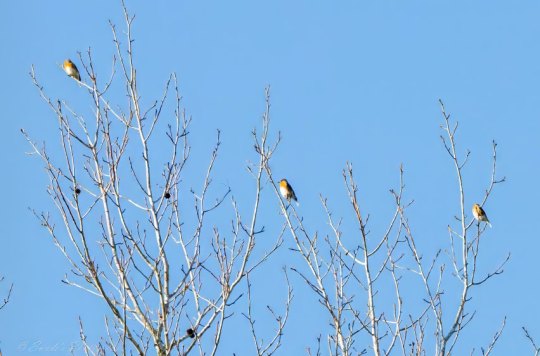
I noticed these three eastern bluebirds (Sialia sialis) high up in a pair of sweetgum trees yesterday. I think I saw them there a few months ago as well. I don't know that it was the same three, but it seems about right. It's probably the same three that I saw on a powerline a couple of days ago.
"Insects caught on the ground are a bluebird’s main food for much of the year. Major prey include caterpillars, beetles crickets, grasshoppers, and spiders. In fall and winter, bluebirds eat large amounts of fruit including mistletoe, sumac, blueberries, black cherry, tupelo, currants, wild holly, dogwood berries, hackberries, honeysuckle, bay, pokeweed, and juniper berries. Rarely, Eastern Bluebirds have been recorded eating salamanders, shrews, snakes, lizards, and tree frogs." - allabooutbirds.org
@birdcounter
#photo#photography#photographer#photographylovers#birds#birdwatching#birdsphotography#birds nature#birds of north america#birdlovers#birdphotography#eastern bluebird#bird#birbs#bird photography#bird watching#birding#birdingphotography
18 notes
·
View notes